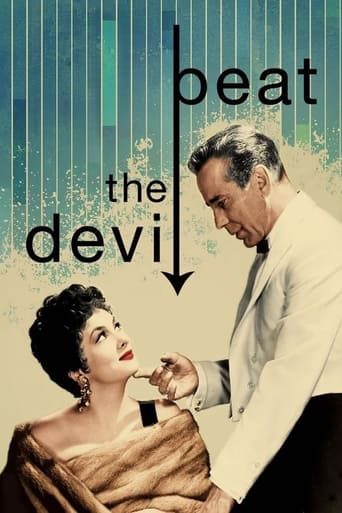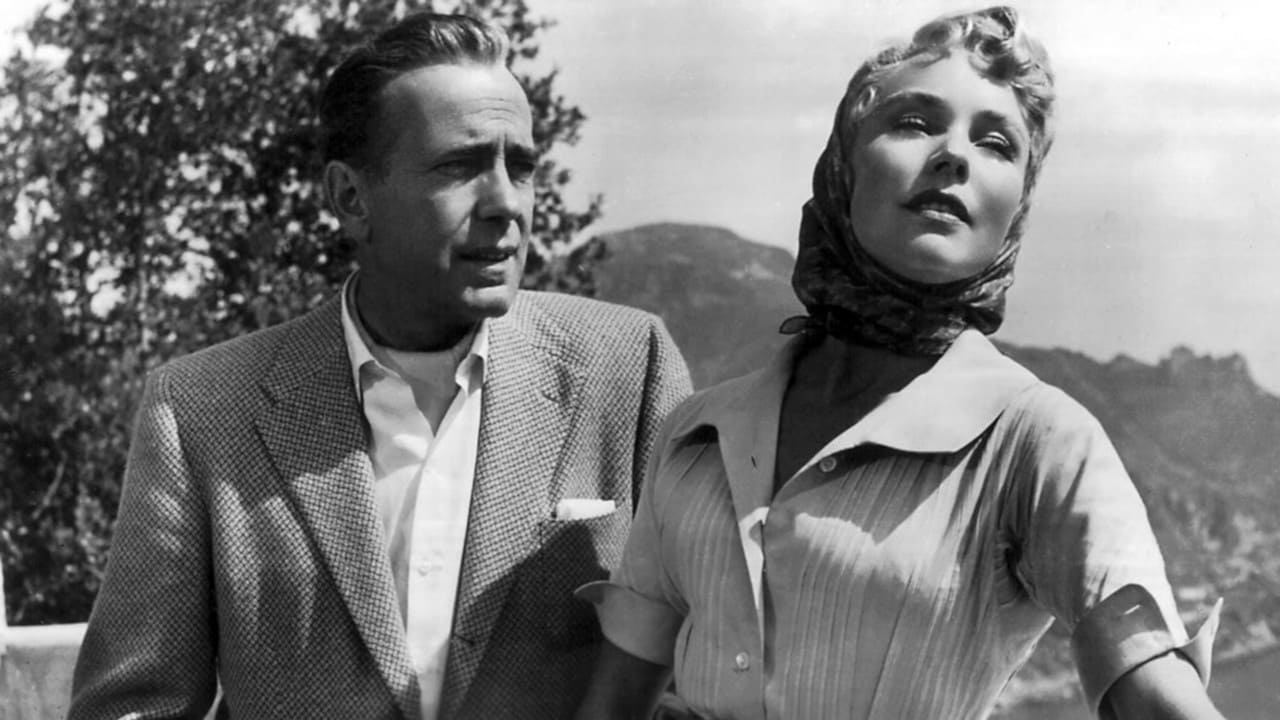atlasmb
John Huston directs Bogart and company in this subdued comedy with the tagline "The bold adventure that beats them all". Well, it is not much of an adventure film and, in my opinion, it is not much of a comedy. Sure the bare bones of a comedy are there, but the stars of the film are not up to the challenge and the beautiful cinematography only serves to undermine the comic aspects of the film.The producers assembled a stellar veteran cast. Consider Humphrey Bogart, Jennifer Jones, Gina Lollobrigida, Robert Morley and Peter Lorre for starters. But several of these stars, especially Bogart, lack the energy and spark that are needed to drive a great comedy. For example, the funniest bit of the film involves an auto accident with unforeseen results. Huston stages and edits the scene in a way that minimizes the comic payoff. It is still fun to see these actors performing together. Despite Bogart's own assessment of the film, it is still very watchable.Regardless, I think many viewers will question the casting of the two male characters who vie for the affections of Jones and Lollobrigida. Some might consider them too long in the tooth.Watch the film, but don't expect laugh out loud moments.
Edgar Allan Pooh
" . . . but the words are not heard," says the North African honcho near the end of BEAT THE DEVIL. This was an apt summary of the thinking in that part of the globe when this flick tried to warn the world of coming events in 1953, and--if anything--it's even more true today. After pretty much every new Terrorist Assault on Civilization, a female apologist persuades publications such as The New York Times and USA Today to run her ode to Political Correctness entitled "We're Not All Like THAT." And, just as John Huston and Truman Capote revealed 63 years ago in BEAT THE DEVIL, these female words invariably fall upon deaf ears in her community. Within hours, days, or at most, a couple of weeks, the latest feminine Mea-Not-Culpa-Dey-Culpa unleashes another wrinkle, whether crock-pot bombing, sidewalk beheading, or newsroom firing squad. In this story, narrator Humphrey Bogart listens to a few too many "female lips," and winds up hoodwinked. Today Bogart's been dead far longer than he was alive, and the world has much less of "the stuff that dreams are made of" to go around, thanks to all the Hoodwinkers who don't want us to BEAT THE DEVIL!
Applause Meter
This is the kind of film made by a film director of solid reputation like John Huston when they want to hang out with the rest of the guys in the Hollywood-hood and spend their off hours partying in exotic locations. Huston and Truman Capote ultimately tinkered with the screenplay together, a pair of self-indulgent jokesters, and however inspired, their efforts put together an offbeat little gem with a storyline that entertains at every complicated plot twist. It's a wacky story about a group of con artists each to a one demonstrating various levels of cunning and idiocy. Meeting up together in the scenic isolation of some southern Italian port town, they're all obsessed with getting to some unnamed country in British East Africa where they plan to grab for themselves a monopoly in uranium deposits. This crew consists of Billy Dannreuther and his wife Maria played by Humphrey Bogart and Gina Lollabrigida. Dannreuther is the seasoned soldier of fortune type, a wanderer of the world always looking for ways to make a million. Bogart, a consummate professional, would never put in a lazy performance but here he shows little enthusiasm and just looks weary and impatient. This, however, actually serves well for the character, Dannreuther being a man who's seen it all and takes nothing for granted. His Italian wife all bosoms, curves and pouty lips is an Anglophile obsessed with all things English from tea in the afternoon to a hunger for the rolling lawns of titled English estates. The couple are in uneasy league with a quartet of ne'er-do-wells, the key members being Peterson, played by Robert Morley, Ivor Barnard as Major Jack Ross, a loony homicidal fascist who believes Hitler and Mussolini had the right idea, and Peter Lorre as Julius O'Hara. O'Hara, so obviously a brand of O'Hara that Ireland never saw, pridefully expresses that O'Hara is a very respectable surname in Chile. He counteracts Dannreuther's frustration with the complications of their scheme by emphasizing what every con man needs to keep in the forefront: "To seem trustworthy is no more important than to be trustworthy." Time has not been kind to Peter Lorre who only age 49 in this movie looks significantly older since his appearance in Huston's 1941 "The Maltese Falcon" twelve years previous. We get a blonde Jennifer Jones of all things, apparently an effort to give her the vibes of the blonde noir babe practiced at duplicity. She's Gwendolen Chelm married to a stock-character British male, a member of the prissy, tight-laced breed, humorless and outwardly dull-witted. Chelm breaks into crisis mode when he finds he didn't pack his hot water bottle. The group of disreputables are waylaid on some North African shoreline after their African bound boat sinks, and taken in for interrogation and detention by horseback marauding Arabs and their leader. These turn out to be not a tribe of terrorists in the modern sense but terrifyingly stupid and intimidating. After Gwendolen rambles on in protest over their detainment, the chief of this band simply points out that "In my country a female may at least know her words are not heard." He may not care what a woman has to say but he certainly is interested in what they look like. It turns out he suffers from a swooning obsession with actress Rita Hayworth, his dream girl whom he'd like to add to is harem. Whichever one of this crew scores the riches at the end of the game doesn't really matter. It's a winner for the viewer.
ElMaruecan82
"Beat the Devil" opens with the arrest of four criminals seeming to come straight from cartoons' universe. Petersen (Robert Morley) is the biggest, fattest, obviously the leader, at the same height, there is the thinner Italian crook Ravello, and on the vertically-challenged department, the rat-faced Major Ross who makes Peter Lorre look almost like a conventional leading man.The least that can be said is that these guys don't quite exude truthfulness especially when they pose as vacuum cleaners' salesmen. When confronting an Arab sheik, Petersen uses some Pidgin English to explain his presence, the Arab reveals himself a worldly and most literate gentleman rightfully suspecting the men to be smugglers. Petersen then invites him to look at them, to see by himself that they don't have the 'working face'
the efforts these natural born crook-looking fellows pull to all look as respectable as possible is as desperate as hilarious.And as if it wasn't hilarious enough, Jennifer Jones intervenes, claiming that she's a British subject and therefore any harm done to her might create a diplomatic incident, to which the Arab dryly retorts that in his country, woman can move their lips but no word they say is ever heard. Yet later, the man reveals himself to be a fan of Rita Hayworth, a weakness that Bogart's character will cleverly exploit. Now, asking the purpose of the Arab sequence in the course of the story is as irrelevant as wondering where the film is leading up to, at that part. "Beat the Devil" is simply a big joke, an enjoyable, truculent and extremely entertaining one.It's the mark of great directors when they depart from their usual standards of seriousness and put the very trademarks they pioneered into self-parodying perspective. "Beat the Devil" is a remarkable demonstration of John Huston's caustic humor and self-detachment. You can tell that Petersen is a parody of Sydney Greenstreet from "The Maltese Falcon" and Morley plays the part to perfection, mixing his intimidating demeanor with irresistible goofiness. I knew there was comical potential in this actor when I saw him in "The African Queen"
and I'm glad Huston felt the same.Peter Lorre also reprises his suavely sinister character with a cigarette holder, only grinning when Petersen expects a reaction to one of his joke. His shining moment remains his unforgettable speech about time: "What is time? Swiss manufacture it. French hoard it. Italians squander it. Americans say it is money. Hindus say it does not exist. Do you know what I say? I say time is a crook." That line comes up early enough in the film, to warn the viewers that this is not a script to underestimate; indeed, it's as full of one-liners as the African lands they try to steal, are in uranium
and as priceless of course.And there is the scene-stealing Major Ross, the only character with no redeemable quality whatsoever apart from being funny: short, ugly, old and with debatable political opinions. Believing Petersen is dead, he utters: "Mussolini, Hitler, now, Petersen" and the worst is that he meant it as a compliment. This is a film where the bad guys bring the most laughs, and where the straight man is Bogart, as a freelance and cynical businessman, with an uncertain approach toward legal matters. He and his wife, played by Gina Lollobrigida, meet an English couple, the Chelms, formed by Jennifer Jones and Edward Underdown. Infatuations grow on each side but since the purity of their motives are questionable, so is the accusation of adultery.Anyway, this colorful gallery reunites in a small port in Italy waiting for the steamer to be repaired so they can go to Africa. The effect of the first frames is startling, the grainy texture of the copy is as poor and under-restored as a (coincidentally) Italian neo-realist movie and the amateurish quality of the sound makes it feel like set in the 20's. We're far from the grandeur and flashiness of "Moby Dick" and "Moulin Rouge", or the menacing shadowy atmosphere of "The Maltese Falcon" and "Key Largo". But this is still a John Huston's film, and only a director so capable of the best can pull so many efforts in a seemingly-worst and contribute to an unintentional masterpiece of B-movie.Through adventure, Film-Noir and comedy, "Beat the Devil" plays with the Hustonian's usual themes: generally about losers trying to satisfy their greed only to become blinded by their own principles or weaknesses (sometimes both are the same) and this translates in "Beat the Devil" with the language of comedy. Whether it's through our criminal quartet, Jones who pretends her husband is a rich landowner, Bogart who gets sucked in the middle of a scheme, ignoring the pay-off, it's like a nihilistic escape whose only purpose is to create funny situations in the kind of exotic and international settings cherished by Huston.Billy Wilder mastered comic writing so much, he couldn't have left something purposeless to the story while John Huston took a novel, adapted it on a day-to-day basis with a 28-year old Truman Capote, and the result, as it seems, is a succession of situations where the character's reliability is constantly put in equation and where every secondary character has something funny to say, whether the imbibed boat captain who wants no trouble in his boat or Bogart's chauffeur who demands reparation after an accident, that Bogart gave him the car being "beside the point".As if the story embraced its own adventurous and risky spirit, the result is a film that doesn't take itself seriously, which is not just ahead of its time, but of our own era of timid, star-studded and money-driven filmmaking. "Beat the Devil" was a gutsy movie, but 60 years later, it's regarded as a classic. I guess time did justice to it, proof that it isn't such a crook, after all.



 AD
AD






